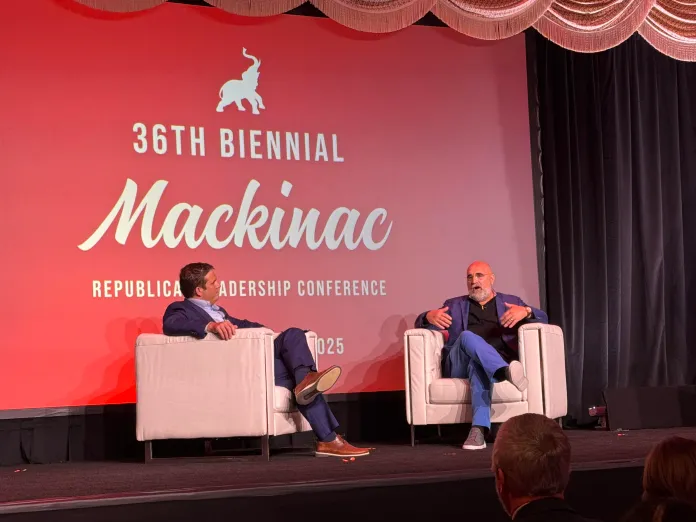MACKINAC ISLAND, Michigan – Mike Rogers will be courting one of the most reliable voting blocs next year with a senior citizen tax break Republicans hope will buoy his run for Senate in Michigan.
In interviews at a leadership conference in northern Michigan, Rogers and his campaign staff highlighted a deduction for Social Security tucked into President Donald Trump’s tax law as a way to appeal to older voters, who historically show up at the polls even without the draw of a presidential election.
Rogers called the provision, which exempts up to $12,000 in Social Security taxes for couples, a “pretty big deal for a lot of people,” a message echoed by Chris LaCivita, a campaign consultant who co-led Trump’s 2024 victory.
“It’s huge, huge. How could you be against that?” LaCivita said.
“Seniors drive a large portion of the overall electorate in a midterm, and if I’m in … the middle of a campaign with a Democrat, and we’re fighting over who voted to tax Social Security and who’s for not taxing it — I mean, I’ll take that battle all day long,” he added.
JOHN JAMES RUN FOR MICHIGAN GOVERNOR FRUSTRATES HOUSE GOP LEADERSHIP: ‘IT STINGS’
Low-income recipients of Social Security already get their benefits tax-free, limiting the share of voters who will feel the law’s effects, but the deduction, which lasts from 2025 through 2028, essentially expands the tax break to middle-income earners.
The provision is one of several Republicans will be touting on the campaign trail as they seek to protect their three-seat Senate majority. Republicans also introduced new, temporary carveouts for tip and overtime wages alongside the permanent extension of Trump’s 2017 tax cuts.
Polling shows the tax law is unpopular with the public, including older voters, based in part on the Medicaid changes enacted to offset the cost of the legislation. Forty-four percent of adults over the age of 65 have a favorable view of the law, according to a July survey by KFF.
Yet Republicans believe the individual elements of the legislation will resonate with voters and have front-loaded the tax breaks so they feel their effects come Election Day. The Social Security deduction, in particular, applies retroactively to the 2025 tax year.
The question of voter turnout has chiefly focused on how Rogers, who is running again after a narrow Senate loss in 2024, will mobilize Republicans without the president’s coattails. He came within 0.3 percentage points of flipping Michigan’s Senate seat but underperformed Trump.
Rogers pointed to a marquee race to replace term-limited Gov. Gretchen Whitmer (D-MI) to argue that voters will stay engaged — “This is not a normal election for a midterm,” he said — but also made the case that the issue sets still favor Republicans, with or without Trump running.
“The agenda is still on the ballot, and people are fired up,” Rogers said on Mackinac Island, where Republicans gathered over the weekend to huddle on electoral strategy. “The problems that the Democrats have given us are still here.”

Democrats, meanwhile, have sought to drive a wedge between Rogers and seniors by pointing to budget blueprints he signed on to during his 14 years serving Michigan in the House.
“Throughout his career, Rogers has consistently supported legislation to undermine Social Security benefits and convert Medicare into a privatized voucher system — positions that directly benefit his corporate donors at the expense of Michigan seniors,” Curtis Hertel, chairman of the Michigan Democratic Party, said in a statement. “Michigan voters rejected his extreme agenda in 2024, and they’ll do it again as Rogers continues pushing policies that will spike costs while stripping away the retirement security our seniors have earned.”
In the interview, Rogers painted the attacks broadly as scare tactics. In his last campaign, he ruled out benefit cuts for Social Security or Medicare but has expressed openness to reforming the programs to make them solvent.
“It’s already started, the Democrats doing the whole – ‘You should be afraid, be scared, be afraid, be scared,’” Rogers said.
“By the way, helping get Medicare straightened out so it’s solid, and there for people — huge,” he added. “This is really important, and we’ll be there.”
Rogers has a stated goal of bringing out 85% of Michiganders who already voted for him once and says his campaign has retooled to get an earlier start.
He acknowledged fundraising was a stumbling block in his first run, and has so far trailed some of his Democratic competitors, but predicted more money would be flowing to his race this cycle. The Senate map is smaller, meaning outside groups, such as the Senate Leadership Fund, are more likely to invest in Michigan.
Rogers also noted that he has an open primary field, unlike in his 2024 race, and entered five months sooner. Democratic voters will choose between Rep. Haley Stevens (D-MI), state Sen. Mallory McMorrow, and Abdul El Sayed, the progressive favorite, in next year’s August primary.
“Candidly, the reason I jumped back in — our numbers look pretty good when you think about how much we got outspent,” Rogers said.

Part of Rogers’s turnout operation will fall to LaCivita, who is credited with reaching the low-propensity voters who buttressed Trump’s winning coalition last year.
LaCivita acknowledged the makeup of the electorate will “be a little bit different” this time around, and that reaching seniors will require more traditional forms of communication.
“Not all of them are walking around with their iPhone,” he said.
But LaCivita signaled that the campaign will deploy many of the same tools used last year to hand Trump a 1-point victory over Harris in Michigan.
“Some of the same strategies that we did in ’24 that were successful for us here are going to be some of the same things that we’re going to be able to bring to bear in a midterm, when the turnout is going to be a lot lower,” he said. “We’re going to cast a wide net.”
Rogers said that he hopes to win over the 100,000-plus Trump supporters who voted split-ticket in Michigan or left their ballot blank for Senate, yet insisted that he could succeed next year without them.
FLINT REPUBLICAN COURTS BLACK TRUMP VOTERS TO FLIP MICHIGAN HOUSE SEAT
“Why that other piece is important, why Chris becomes important is — this is icing on the cake, and it builds our party for the future,” he said.
“He’s going to help us do that with that group,” Rogers added. “I get 10% of that, I would have won — if I get 50% of that, I can’t be beat.”
In terms of seniors, the over-65 vote has been closely divided for years, with exit polling showing that 51% voted for President Joe Biden in 2020 and 53% for Vice President Kamala Harris in 2024.
